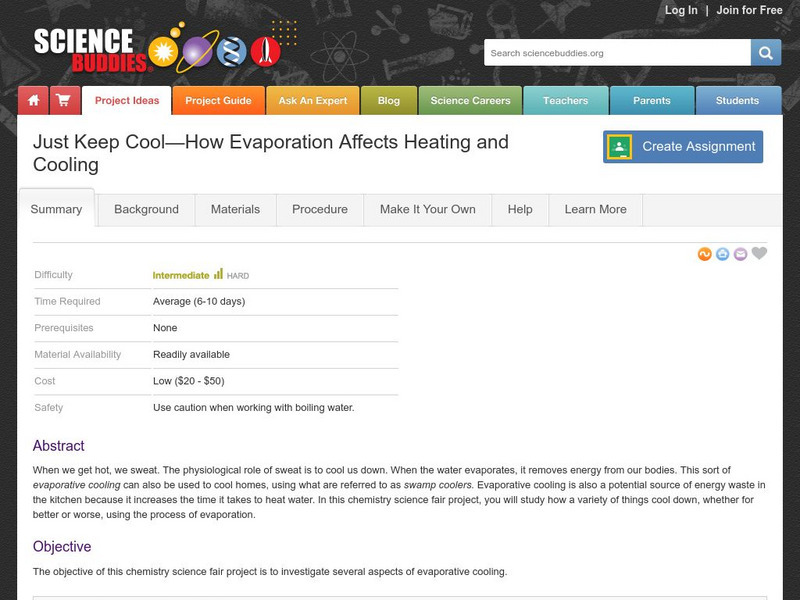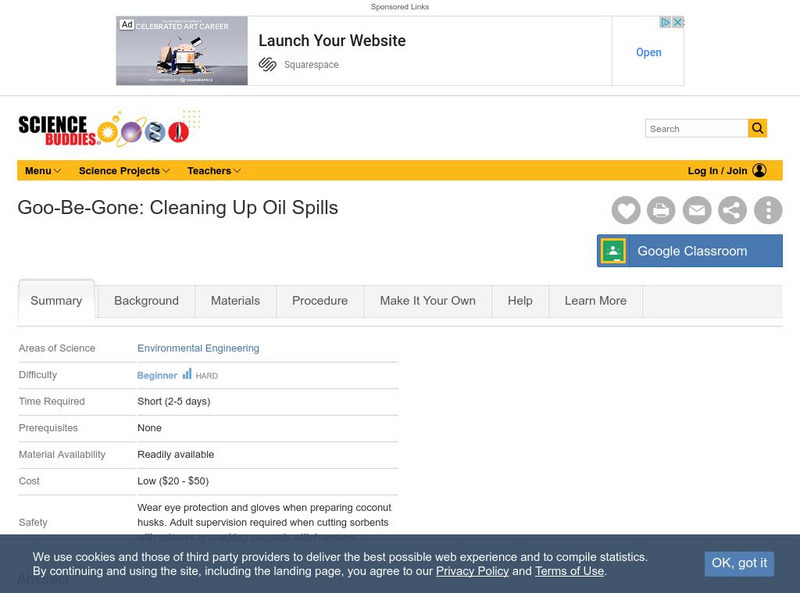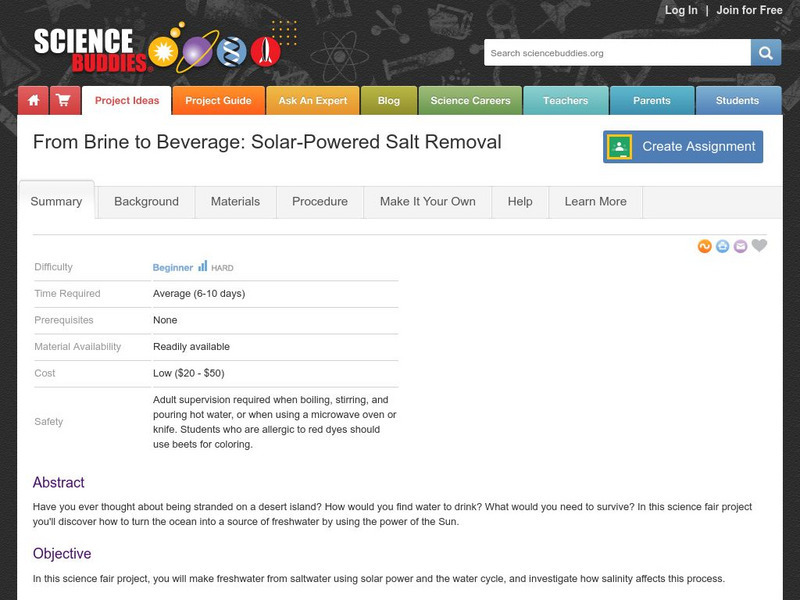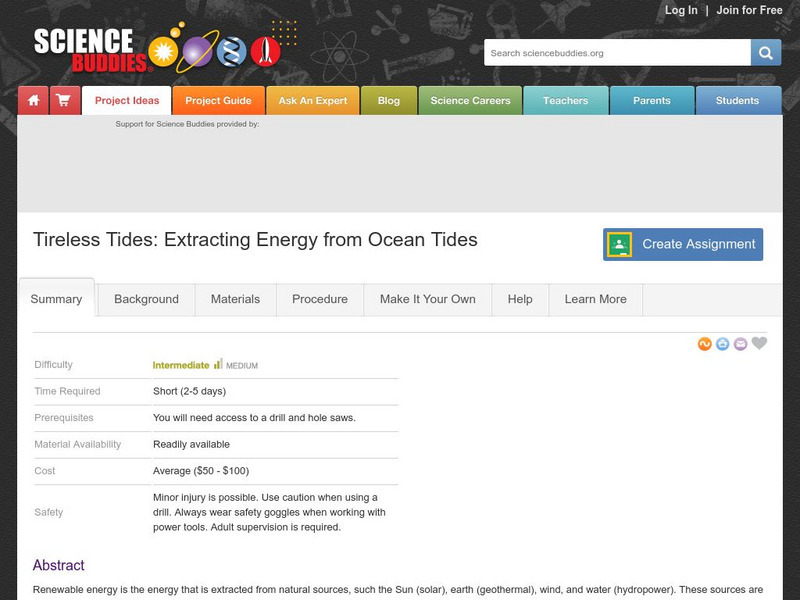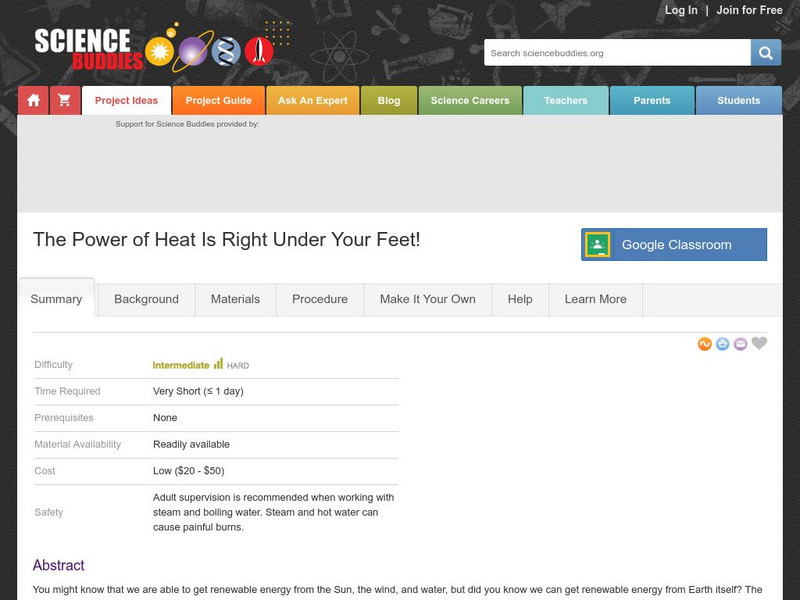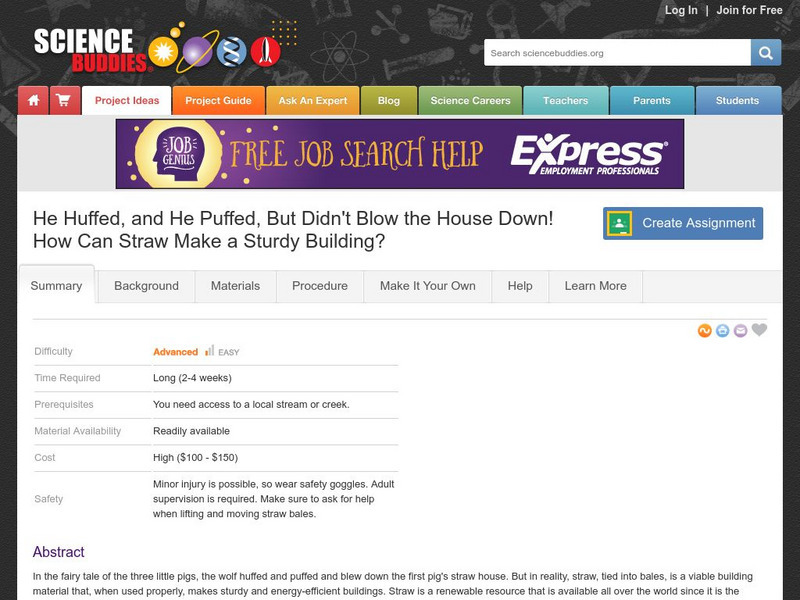Hi, what do you want to do?
Science Buddies
Science Buddies: Just Keep Cool How Evaporation Affects Heating and Cooling
When we get hot, we sweat. The physiological role of sweat is to cool us down. When the water evaporates, it removes energy from our bodies. This sort of evaporative cooling can also be used to cool homes, using what are referred to as...
Science Buddies
Science Buddies: Goo Be Gone: Cleaning Up Oil Spills
Oil spills devastate wildlife and our precious water resources. Test the absorptivity of different materials (sorbents) to discover which ones are best at removing oil from water in this brief lab.
Science Buddies
Science Buddies: Pop Goes the Geyser!
Our home, Earth, is a living planet. Earthquakes and volcanic eruptions are proof that the geological forces that shaped our planet and created the land masses are ongoing. An amazing example of geologic activity that is less damaging is...
Science Buddies
Science Buddies: From Brine to Beverage: Solar Powered Salt Removal
In this science fair project you'll discover how to turn the ocean into a source of freshwater by using the power of the Sun, and the water cycle. You will ultimately find just how salinity affects this process.
Science Buddies
Science Buddies: Tireless Tides: Extracting Energy From Ocean Tides
Renewable energy is the energy that is extracted from natural sources, such the Sun (solar), earth (geothermal), wind, and water (hydropower). These sources are renewable because they can be replenished by the same natural sources within...
Science Buddies
Science Buddies: The Power of Heat Is Right Under Your Feet!
You might know that we are able to get free energy from the Sun, the wind, and water, but we can also get free energy from Earth itself. This source of energy is called geothermal energy and it is all about taking advantage of the heat...
Science Buddies
Science Buddies: Riprap: It's Not Hip Hop but Erosion Stop
The Grand Canyon serves as an excellent example of just what water can do over a period of millions of years. This week long lab will help you understand how erosion works, how engineers work to help prevent erosion.
Science Buddies
Science Buddies: Waste Not, Want Not: Use the Microbial Fuel Cell to Create Elec
Gross. What is that in the toilet? But maybe it's not just gross. Did you know there are bacteria that digest organic waste and create electrons? What if there was a way to collect those electrons to power a circuit? In this science fair...
Science Buddies
Science Buddies: Cold Room? Heat It Up With a Homemade Solar Air Heater
Humans need food, water, and warm shelter to survive. But a lot of humans depend on fossil fuels to supply gas and electricity to heat our homes. But burning fossil fuels to create energy is harmful to the environment. In this science...
Science Buddies
Science Buddies: Ocean Currents: Modeling 'Global Conveyor Belt' in Your Kitchen
Ocean currents have a profound effect on the climates of the continents, especially those regions bordering on the ocean. The Gulf Stream makes northwest Europe much more temperate than any other region at the same latitude, and the...
Science Buddies
Science Buddies: Froggy Forecasting: How Frog Health Predicts Pond Health
Have you ever heard the expression "a canary in a coal mine"? In the 1900s and earlier, coal miners brought canaries with them into the mines to act as early warning signals. The canaries were very sensitive to low levels of dangerous...
Science Buddies
Science Buddies: Swimming in Acid: Understanding Ocean Acidification
The oceans are a precious natural resource, part of Earth's carbon cycle. But what happens if the oceans absorb too much carbon dioxide? Many scientists are concerned that the increased absorption of carbon dioxide is causing them to...
Science Buddies
Science Buddies: He Huffed, and He Puffed, but Didn't Blow the House Down!
In the fairy tale of the three little pigs, the wolf huffed and puffed and blew down the first pig's straw house. But in reality, straw tied into bales is a viable building material that when used properly, makes sturdy and...
Science Struck
Science Struck: Water Cycle: An Easy Explanation for Kids
Provides a simple explanation of the water cycle by describing four main stages - evaporation, condensation, precipitation, and collection. Includes three project ideas and some interesting facts.
Other
Terc: Catching Sunshine
A hands-on challenge to build a solar collector to investigate how much the air temperature inside the collector goes up. Site includes information for teachers and students. Teachers page include time requirement, materials needed, the...
abcteach
Abcteach: Earth Day Activities
[Free Registration/Login Required] How can you treat the earth with more respect? Check out this resource featuring links to elementary activities to celebrate Earth Day. You will find word searches, crossword puzzles, reading...





